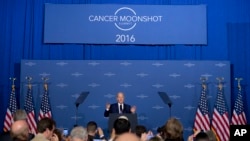Vice President Joe Biden threatened Wednesday to pull federal funding for cancer studies that fail to publicly disclose their results, putting pressure on researchers, clinicians and drug companies to speed up progress toward cancer cures.
Hosting a cancer summit in Washington, Biden said the culture in the cancer research world is stifling progress, and he was “committed to doing everything in my power'' to change that culture. He cited concerns that prominent medical institutions that receive millions in taxpayer dollars are flouting a federal rule that says they must submit their results to a publicly accessible database within a year.
“Doc, I'm going to find out if it's true, and if it's true, I'm going to cut funding,'' Biden said. “That's a promise.''
For months, Biden has been imploring cancer researchers to share their data and trial results more freely, so that scientists can build on each other's progress and more readily identify treatments that might work for individual patients. His ultimatum at the summit was the first time Biden has suggested that failure to heed that call could lead to National Institutes of Health grants being terminated.
There's no mechanism in place to enforce the mandate that trial results be quickly posted to www.clinicaltrials.gov, where patients and their doctors can identify treatments that have been effective for other patients. The Obama administration is developing a rule to crack down on those who ignore the requirement, the White House said.
At the summit, the showpiece of Biden's yearlong “moonshot,'' the vice president said the world was “on the cusp of breakthroughs.'' Yet he suggested the cancer community was essentially standing in its own way. He called out drug companies for unnecessary price increases and major research hospitals for insufficient collaboration.
“It's not anybody's fault, but we've got to fix it,'' Biden said.
Researchers’ reactions
Cancer researchers and their institutions have pushed back on those critiques, arguing they already share reams of data and partner frequently with each other and the government. They've also cited major hurdles imposed by federal agencies with intense bureaucratic requirements that make it near-impossible to develop treatments quickly and get them approved for patients — a concern that Biden acknowledged.
For Biden, the conference comes as time is running out to make good on his pledge to double the rate of progress toward a cure before leaving office. Biden had hoped to dramatically boost government activity on cancer, but his campaign has run up against the same political and logistical obstacles that have challenged other White House priorities.
To fund Biden's effort, President Barack Obama asked Congress for $1 billion over two budget years for research. Only a fraction has been approved. So Biden's focus has shifted to trying to highlight and streamline private and nonprofit research efforts.
To illustrate what's on the cutting edge, the Energy Department and the National Cancer Institute announced new programs to analyze cancer data with supercomputers, plus another computing program teaming up with drugmaker GlaxoSmithKline to speed up drug development. IBM unveiled plans to donate its Watson supercomputing technology to help Veterans Affairs ramp up its precision medicine program by sequencing the genomics of tumors for 10,000 patients over two years.
“Those are the types of partnerships that really start to push things forward,'' IBM Watson Health Vice President Steve Harvey said in an interview. “We kind of need each other in this journey.''
Biden, who was introduced at the summit by comedian Carol Burnett, seemed mindful of the concern that he's pursuing a personal mission to address an issue that's affected his family. Biden declared the cancer “moonshot'' last year after his son, former Delaware Attorney General Beau Biden, died of brain cancer.
“This isn't about him, it's not about a single person, it's about us,'' Biden said. “Not giving up hope. And having the urgency of now.''




